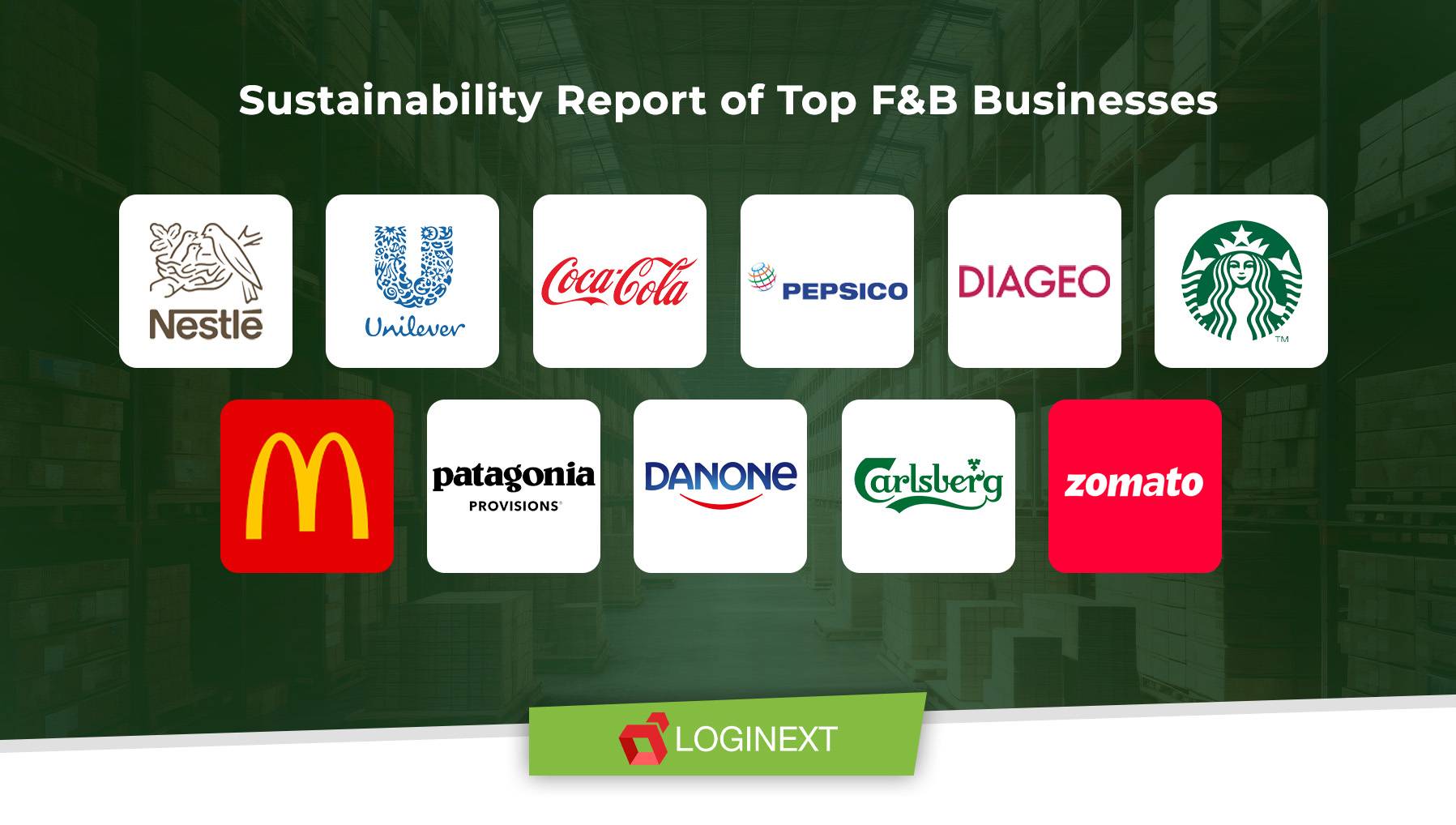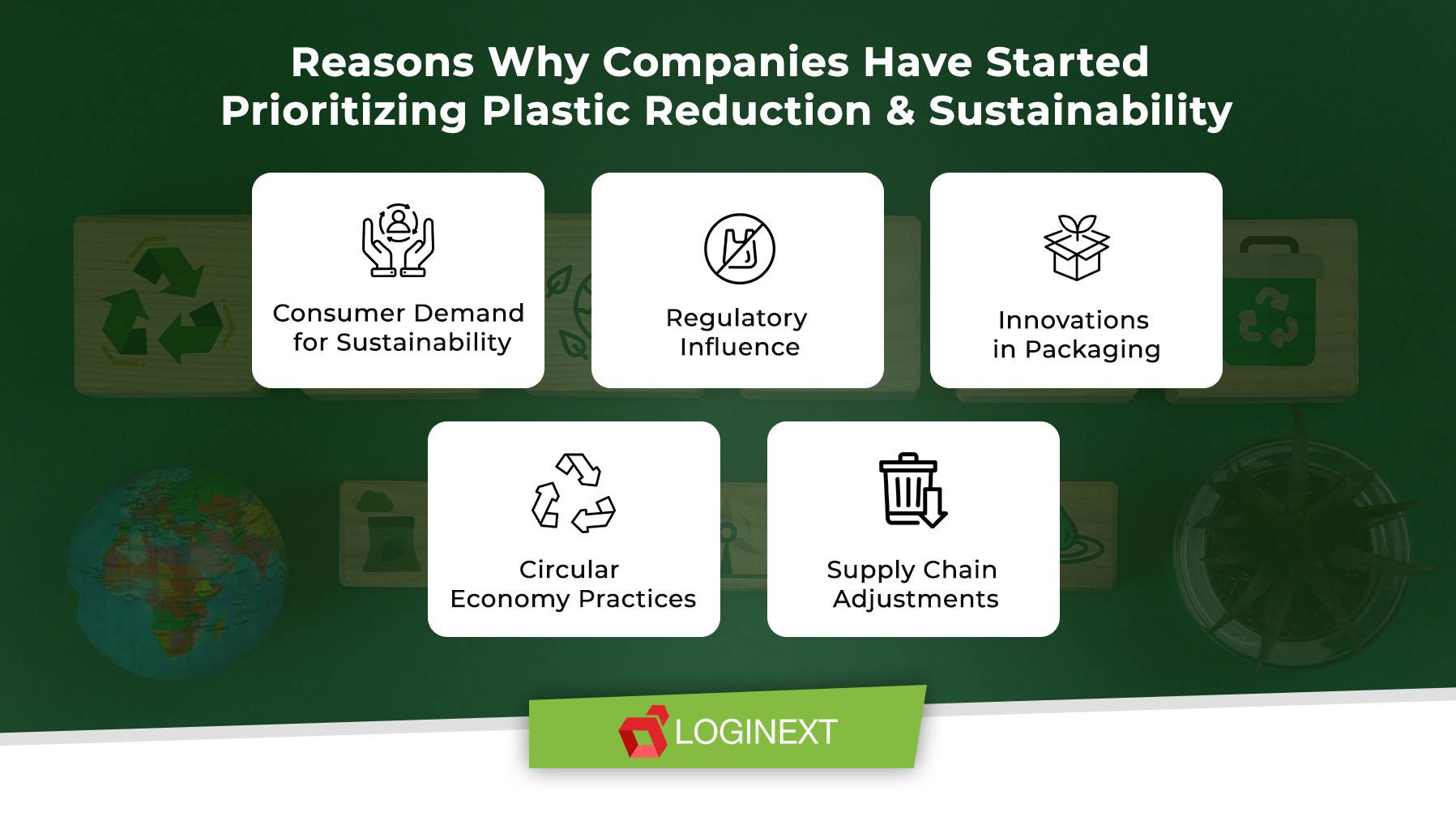
Sustainability Report: Top 10 Food and Beverage Service Providers
74% of customers indicated a higher purchase intent from brands that champion sustainability.
In recent years, the food and beverage (F&B) industry has increasingly focused on reducing plastic use and enhancing sustainability. This shift is driven by growing environmental concerns, regulatory pressures, and changing consumer preferences.
For F&B manufacturers, three of their top five sustainability commitments involved plastic reduction.
Companies are adopting innovative strategies and technologies to minimize their ecological footprint and develop sustainability in food and beverage industry.
77% of businesses are willing to invest in sustainable solutions despite economic challenges.
Must Read: How To Move Towards Sustainability With Precise Logistics Route Planning And Optimization?
Sustainability Report of Top 10 F&B Service Providers
Many businesses in the food and beverage industry are actively working towards reducing plastic usage and enhancing sustainability. Here are some notable examples across different segments of the industry:

46% more packages made with plant-based polymers in 2023 compared to 2021, stated Gilles Tisserand, Vice President of Climate & Biodiversity at Tetra Pak.
1. Nestlé
They are one of the world’s largest food companies and has made significant commitments to sustainability. The company aims to make 100% of its packaging recyclable or reusable by 2025 and has begun to eliminate single-use plastics across various products. For instance, Nestlé introduced paper packaging for its Smarties candy brand, which is a significant step away from traditional plastic packaging.
2. Unilever
Unilever, one of the world’s leading consumer goods companies, has made substantial commitments to reduce its plastic footprint. The company announced ambitious plans to halve its use of virgin plastic by 2025 and to ensure that all of its plastic packaging is fully reusable, recyclable, or compostable by the same year. Unilever is also investing in circular economy projects and has pioneered the use of recycled plastics in its packaging for various products, including its popular brands like Dove and Hellmann’s.
3. Coca-Cola
It is taking steps to address its environmental impact with a global initiative called “World Without Waste.” The beverage giant aims to collect and recycle the equivalent of every bottle or can it sells by 2030. Coca-Cola is also working on improving the sustainability of its packaging by increasing the content of recycled material in its plastic bottles and developing plant-based biodegradable plastics. These initiatives are part of a broader strategy to achieve a 100% recyclable packaging model and reduce dependency on virgin plastics.
4. PepsiCo
PepsiCo is another major player focusing on sustainable packaging solutions. The company has pledged to reduce virgin plastic use across its beverage business by 50% by 2030. They are increasing the use of recycled materials and have introduced the first 2-liter bottle made from 100% recycled PET plastic in the United States. PepsiCo is also experimenting with biodegradable film resins for snack packaging.
5. Diageo
Diageo, a global leader in beverage alcohol, has launched the world’s first ever 100% plastic-free paper-based spirits bottle, made entirely from sustainably sourced wood. This innovation is part of their broader commitment to reducing their environmental footprint and pioneering new sustainable packaging technologies.
6. Starbucks
Starbucks is well-known for its efforts to reduce plastic waste, primarily through its initiative to eliminate plastic straws across all its stores globally. The company has introduced strawless lids and is investing in developing more sustainable cup technologies. Additionally, Starbucks is working towards a goal of reducing waste, water use, and carbon emissions by 50% by 2030.
7. McDonald’s
McDonald’s has been active in its efforts to reduce plastic waste across its global operations. The fast-food leader has committed to sourcing 100% of its guest packaging from renewable, recycled, or certified sources by 2025 and aims to recycle guest packaging in all of its restaurants by the same year. McDonald’s is also replacing plastic straws with paper straws across its locations worldwide and has begun using more eco-friendly materials for its cutlery, plates, and packaging thereby contributing towards sustainability in food and beverage industry.
8. Patagonia Provisions
Patagonia Provisions, a subsidiary of outdoor apparel company Patagonia, focuses on sustainable food products. They offer a range of organic, regeneratively farmed, and ethically sourced foods, all packaged in eco-friendly materials. Their packaging often includes compostable materials and recycled content, aligning with their mission to support sustainable agriculture and reduce environmental impact.
9. Danone
Danone has taken several steps to improve sustainability, notably through its brands like Evian, which has pledged to become a circular brand by 2025. This includes initiatives to produce bottles made entirely from recycled plastic and innovative practices like deploying a carbon-neutral bottling site.
10. Carlsberg
The Carlsberg Group has been pioneering its sustainability efforts by developing the Green Fibre Bottle, a beer bottle made from fully biodegradable wood fiber. Carlsberg aims to reduce its full-carbon footprint by 30% by 2030, and this innovative packaging plays a crucial role in that strategy.
11. Zomato
Zomato is a major player in the food delivery industry. It has introduced several initiatives aimed at reducing plastic waste and promoting sustainability in food and beverage industry. Recognizing the environmental impact of single-use plastics commonly used in food delivery, Zomato launched the “No Plastic Cutlery” option on its app, allowing customers to choose not to receive plastic cutlery with their orders. This initiative helps reduce plastic waste, encouraging both restaurants and consumers to think more sustainably about their use of disposable plastics.
Quick Read: How to avoid food wastage using a TMS solution?
Reasons Why Companies Have Started Prioritizing Plastic Reduction and Sustainability

1. Consumer Demand for Sustainability
Consumers are more environmentally conscious than ever before. A significant segment of the market now prefers products that are packaged sustainably. This shift in consumer behavior has encouraged brands to rethink their packaging strategies, moving away from single-use plastics towards more sustainable options. Companies are not only aiming to meet these expectations but also to build brand loyalty among eco-conscious consumers.
42% of consumers are willing to pay more for “environmentally sound” packaging
2. Regulatory Influence
Governments around the world are tightening regulations on plastic use. Bans and restrictions on single-use plastics are becoming more common, compelling the food and beverage industry to seek alternative materials. For instance, the European Union’s directive on single-use plastics pushes companies to find biodegradable or recyclable solutions. Compliance with these regulations is not just about avoiding penalties but also about being seen as a responsible corporate citizen.
Part of the European Green Deal includes initiatives to ensure that all packaging in the EU market is reusable or recyclable in an economically viable way by 2030.
3. Innovations in Packaging
The drive towards sustainability in food and beverage industry has sparked a wave of innovation in packaging materials and designs. Biodegradable plastics, made from natural materials such as corn starch, and plant-based packaging options are gaining traction. These materials decompose much faster than traditional plastics and have a smaller carbon footprint. Moreover, advancements in packaging technology have led to the development of thinner, lighter materials that maintain the product’s integrity but use less plastic overall.
The global biodegradable plastic packaging market was $4.2 billion in 2019 and is projected to reach $9.0 billion by 2027. The growth projectile at a CAGR of nearly 9.9% from 2020 to 2027.
4. Circular Economy Practices
Many companies in the food and beverage sector are embracing the principles of a circular economy, where materials are kept in use for as long as possible. For example, some are implementing returnable packaging systems or partnering with recycling firms to ensure that plastics are reused. This not only helps reduce waste but also lessens the demand for new plastic production.
IKEA aims to become a 100% circular business by 2030. PepsiCo’s vision is to make its packaging 100% recyclable and increase its use of recycled content to 50% in its plastic packaging by 2030.
5. Supply Chain Adjustments
Achieving sustainability goals often requires significant changes throughout the supply chain. Companies are assessing their suppliers based on sustainability criteria, such as the use of renewable energy and waste reduction practices. By integrating sustainability into their core operations, businesses can ensure more environmentally friendly production processes and reduce overall environmental impact.
A survey by BCG found that over 40% of companies have set specific carbon reduction targets for their supply chain operations, aiming for cuts ranging from 30% to as much as 100% by 2030.
Check Out: LogiNext’s GHG Calculator
6. Transparency and Consumer Education
As the industry shifts towards sustainable practices, transparency has become crucial. Companies are increasingly disclosing information about their packaging materials and sustainability initiatives. Consumer education campaigns are also important, as they help customers understand the benefits of sustainability and how to properly dispose of or recycle packaging materials.
44% of consumers say that environmental sustainability labels on products affect their purchasing decisions.
How can LogiNext Help Meet Sustainability in Food and Beverage Industry?
LogiNext, a leading provider of transportation management software, plays a crucial role in helping businesses enhance their sustainability efforts. By optimizing delivery routes and reducing unnecessary travel, we help companies lower their carbon emissions. Our real-time tracking capabilities ensure that resources are utilized efficiently, leading to significant reductions in fuel consumption and operational costs. Additionally, analytics tools enable companies to analyze trends and make data-driven decisions that support long-term sustainability goals.
Don’t Miss: LogiNext’s Smart Routing Software Helps Brands Deliver Sustainably
Sustainability FTW with a Reliable Transportation Management Software
The food and beverage industry’s prioritization of plastic reduction and sustainability is a response to the urgent need for environmental administration. By adopting sustainable practices, the industry not only mitigates its environmental impact but also aligns with consumer expectations and regulatory requirements. This allows businesses to secure their place for a more sustainable and responsible future.
The sustainability trend is expected to continue growing, driving further innovations and collaborations aimed at achieving a greener planet. Tools and solutions from companies like LogiNext further empower these businesses to achieve their sustainability objectives, ultimately contributing to a more sustainable future for all. To know more about our transportation management software, click on the red button below.
107







@LogiNext